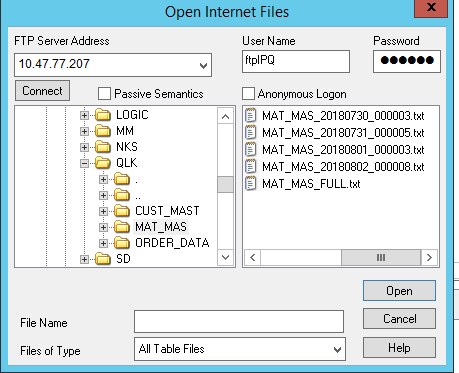Unlock a world of possibilities! Login now and discover the exclusive benefits awaiting you.
- Qlik Community
- :
- All Forums
- :
- QlikView App Dev
- :
- How to handle incremental load in qlik view
- Subscribe to RSS Feed
- Mark Topic as New
- Mark Topic as Read
- Float this Topic for Current User
- Bookmark
- Subscribe
- Mute
- Printer Friendly Page
- Mark as New
- Bookmark
- Subscribe
- Mute
- Subscribe to RSS Feed
- Permalink
- Report Inappropriate Content
How to handle incremental load in qlik view
Hi all ,
I have a query regarding handling incremental load in which I have the following scenario:-
I have a business which deals with two seasons winter and summer as 18A and 18P respectively.Here the data for both seasons is available ( full load) on FTP (Data source)
All the incremental files are also available on ftp .On daily basis the incremental data is also created on same FTP. This data do not contain any duplicate records. Please help how to handle the same ?
FULL LOAD
Material_Master:
LOAD distinct MATERIAL,
COLOR,
SIZE,
[Size Group],
Description,
COMPOSITION,
BRANDCD,
BRAND,
SEASON,
SEASONDESC,
THEME,
DELYCODE,
GENDER,
ProductHierarchy,
MaterialGroup,
[Core/Fashion],
FIT,
PATTERN,
[Key/NonKey],
RANGE,
ORIGIN,
[Top/Bottom],
SLEEVE,
NECK,
WEATHER,
OCCASSION,
CustomDesc,
MaterialGrp4,
MGRP4DESC,
EAN,
ALTEAN,
PurchaseGroup,
PurchaseGroupDesc,
CATEGORY,
SUBCAT,
BASECOMP,
MaterialType,
ValuationClass,
COST,
MRP,
ChangeDt
FROM
[ftp://ftpIPQ:ftpben16@10.47.77.207/IFR/IAP/QLK/MAT_MAS/MAT_MAS_FULL.txt]
(txt, codepage is 1252, embedded labels, delimiter is '|', msq);
store Material_Master into C:\Users\dmsadmin\Desktop\New folder\QVD\extract_qvd\Material_Master_Full.qvd;
drop table Material_Master;
NOTE
MAT_MAS_20120780_00003.txt and etc is the incremental load files whereas MAT_MAS_FULL.txt is full load

- Mark as New
- Bookmark
- Subscribe
- Mute
- Subscribe to RSS Feed
- Permalink
- Report Inappropriate Content
May be like this:
Let ThisExecTime = Now( );
QV_Table:
SQL SELECT PrimaryKey, X, Y FROM DB_TABLE
WHERE ModificationTime >= #$(LastExecTime)#
AND ModificationTime < #$(ThisExecTime)#;
Concatenate LOAD PrimaryKey, X, Y FROM File.QVD
WHERE NOT EXISTS(PrimaryKey);
Inner Join SQL SELECT PrimaryKey FROM DB_TABLE;
If ScriptErrorCount = 0 then
STORE QV_Table INTO File.QVD;
Let LastExecTime = ThisExecTime;
End If
Check these:
https://www.resultdata.com/three-types-of-qlikview-incremental-loads/.
https://www.analyticsvidhya.com/blog/2014/09/qlikview-incremental-load/
- Mark as New
- Bookmark
- Subscribe
- Mute
- Subscribe to RSS Feed
- Permalink
- Report Inappropriate Content
Hi
when I am implementing what is given in the above link I am getting type D inconsistency error in my script
- Mark as New
- Bookmark
- Subscribe
- Mute
- Subscribe to RSS Feed
- Permalink
- Report Inappropriate Content
- Mark as New
- Bookmark
- Subscribe
- Mute
- Subscribe to RSS Feed
- Permalink
- Report Inappropriate Content
Type D, Its related to your memory of server . if you application require more memory compare to available memory, normally this error comes. If it is unable to consume memory during application reloading or debugging then this issue occurs.
This is when a scripting or data error (instead of inner or left join) results in a Cartesian join of two sizeable tables, i.e. QV tries (and fails) to creates millions of rows. A symptom of this particular scenario is that QV gobbles up all memory before crashing.